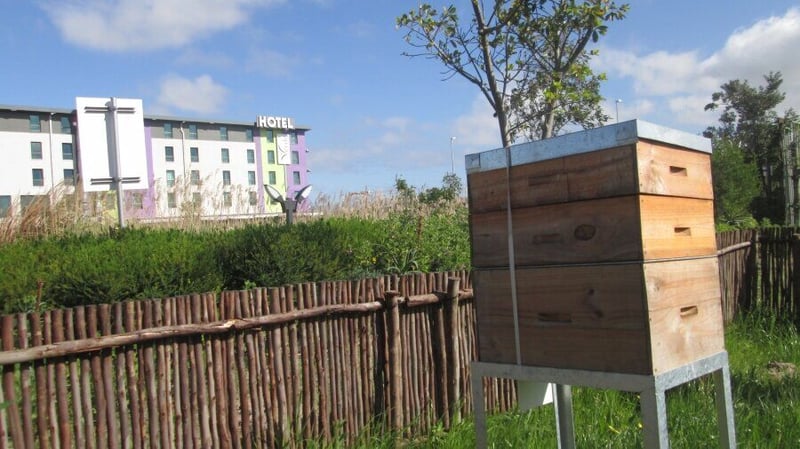Hotel Verde and the Importance of Bee-ing
Written by: Vanessa Northing Save to Instapaper
"If the bee disappears from the surface of the earth, man would have no more than four years to live"~ Albert Einstein
The better part of the population doesn’t realise the importance of bees. Those little black and yellow striped creatures are vital to our civilization - in fact one-third of our food supply can be attributed to bees!
Over and above Hotel Verde’s environmentally conscious technological installations, construction and operational practices, they have embarked on several interesting outdoor initiatives to consciously acknowledge and manage the impact of their operations on the environment and local community, and to further reduce their carbon footprint. One such initiative is beekeeping – that of the Cape honeybee (Apis mellifera subsp. capensis) typically found in the winter rainfall regions of Southern Africa.
Significant international attention has lately been paid to bee populations, which have been declining for years – attributed to a combination of factors, namely, parasites, pesticides, genetically engineered crops, pollution and loss of habitat.
The lives of humans and bees are intricately linked - one out of every three bites of food we eat is made possible by bees and other pollinators! Bees are not only vital to us humans but also for the planet – we require animal pollination for 85% of flowering plants – these bees are producing fruits and seeds from pollination that feed just about everything from larks to aardvarks.
In March Hotel Verde constructed 2 beehives that house over 60 000 bees. They are suitably located within the wetland area – water being a vital component for the bees survival - a little away from the hotel and guests so that neither are disturbed and because they always follow the same flight path, one that is unobstructed.
The area is teeming with indigenous life - with flowers, shrubs and trees planted by ACSA (Airports Company of South Africa), whilethe beautification project by Hotel Verde, including some 130 endemic indigenous trees, has created a perfect environment for the bees. The pedestrian walkway and cycling track with its landscaped adjoining strip situatedall along Michigan Street allows for convenient public and guest commuting whilst minimizing the impact on the bees. All in all, this allows the bees to do what they do best: pollinate flowers, maintain our ecosystems and ultimately supply the population with food, all whilst supplying that delicious by-product, honey.
“Isn’t it amazing, this marvellous ability the bees have to convert the simple source of plant nectar into the sweet sauce of nature’s honey,” says Samantha Annandale, General Manager of Hotel Verde.
The general pattern of bee life involves making and storing honey in wax combs from spring to autumn. They feed on the stored supply in winter and the honey is collected during summer, around February. Hotel Verde’s hives are maintained by Little Creatures, a local honey farm, and the honey is used in the restaurant and is for sale in the Deli.
Did you know:
- The bee is the only insect that produces food eaten by man.
- Honey is the only food that includes all the substances necessary to sustain life, and contains an antioxidant that improves brain functioning.
- A colony of bees consists of 20,000 - 60,000 honeybees and one queen.
- Honeybees communicate by performing a series of dance moves indicating the distance and the direction of the food in relation to the sun.
- Water is essential to make honey and keep the bees hydrated.
- The average worker bee produces about 1/12th teaspoon of honey in her lifetime.
- A hive of bees will fly up to 38,000 kilometres to collect 1 kg of honey.
You can also do your bit to help by planting a mix of flowers with different shapes, colours and blooms – herbs, fruit and vegetables are great too. Brush piles and bare patches of soil help bees dig nests and by choosing organic foods and organic seedlings for your garden you will help promote healthy ecosystems.
Mario Delicio, owner of Hotel Verde says that he and the staff are encouraged on a daily basis by the improvements and growth of all their outdoor initiatives and the positive impact they are having on the environment and community, “in particular the bees who are working their special kind of magic.”
Get new press articles by email
Latest from
- Companies are outsourcing their financial operations, here’s why it’s a good idea.
- Uprise Markets launches a simpler way to trade CFD’s
- Orion Group move entire portfolio into the clouds
- Otto Stehlik joins BON Hotels
- Section 12J - are investors missing the VCC boat?
- Backpackers to the front please!
- THE FUTURE OF PROPERTY MANAGEMENT SYSTEMS - DON’T GET LEFT BEHIND
- BON Hotel Midrand - Cleaning up!
- Hotel Verde offers school Eco-outings
- HOTEL VERDE receives World Responsible Tourism Award
- Is the Vaal Heading for a Revival?
- Shelley Point Hotel gets the Business Rescue treatment
- Having a Ball for Mandela Day
- BON Hotels Begins Gauteng Footprint
- Promising the Earth at Hotel Verde
The Pulse Latest Articles
- Education Is The Frontline Of Inequality, Business Must Show Up (December 11, 2025)
- When The Purple Profile Pictures Fade, The Real Work Begins (December 11, 2025)
- Dear Santa, Please Skip The Socks This Year (December 10, 2025)
- Brandtech+ Has 100 Global Creative Roles For South African Talent (December 9, 2025)
- The Woman Behind Bertie: Michelle’s Journey To Cape Town’s Beloved Mobile Café (December 9, 2025)
